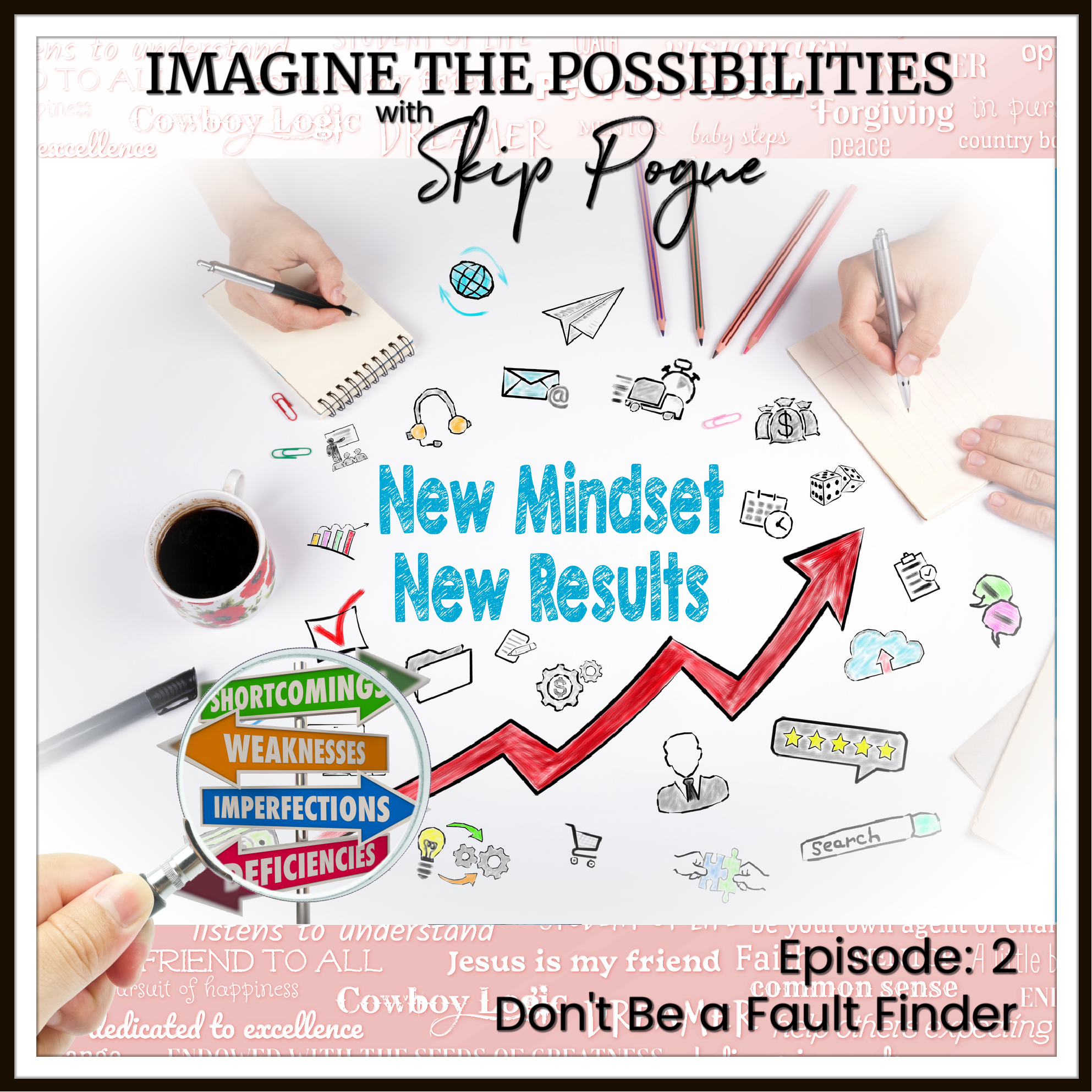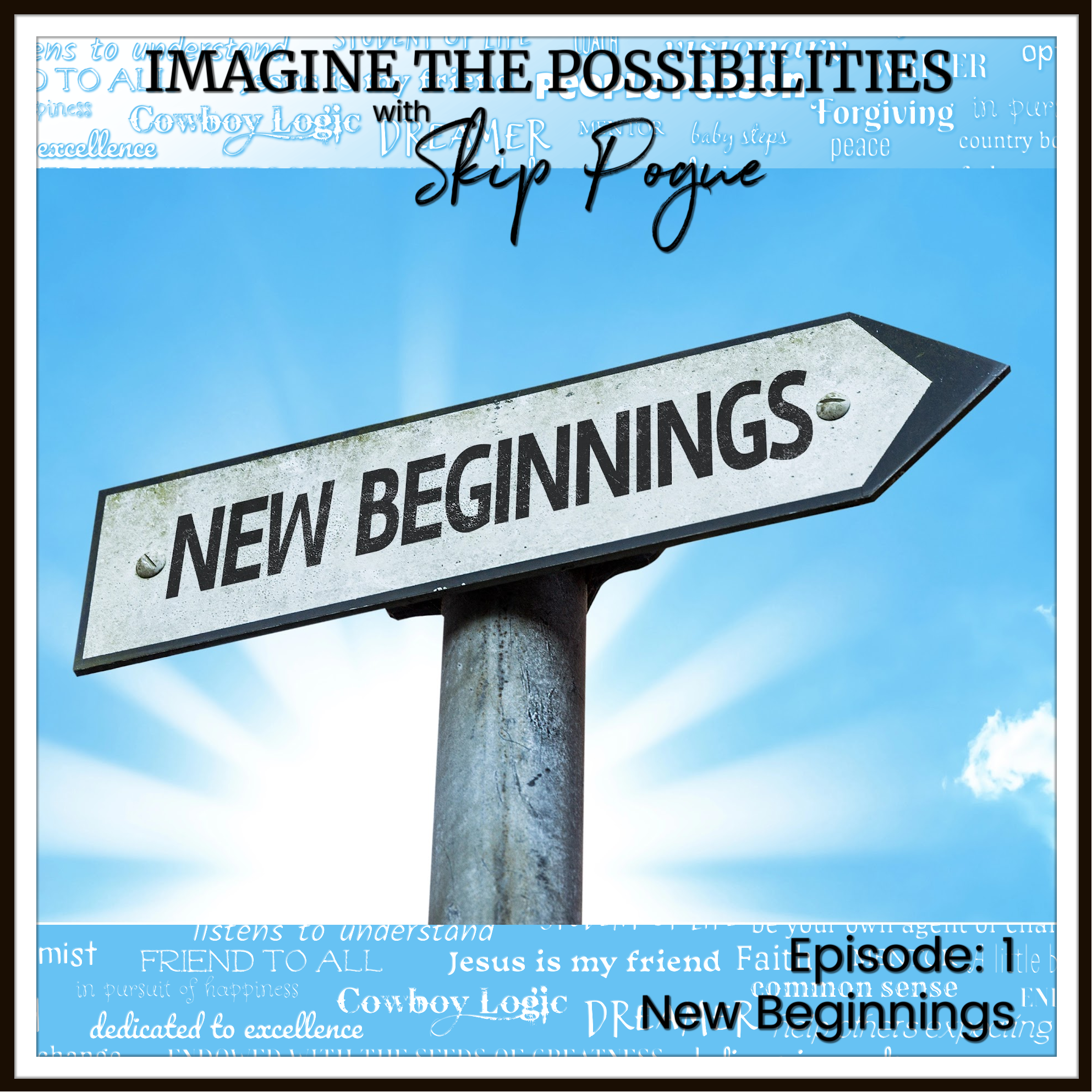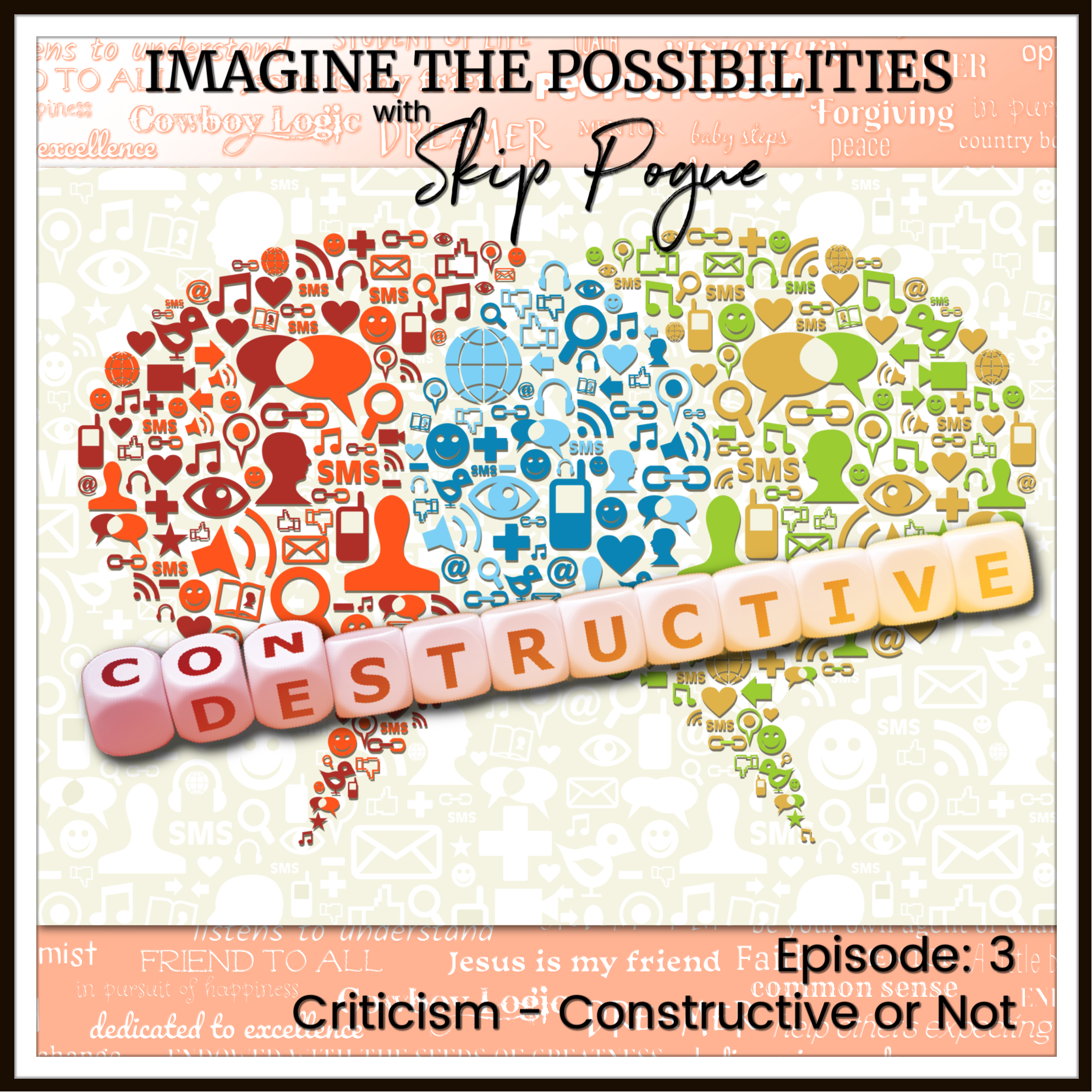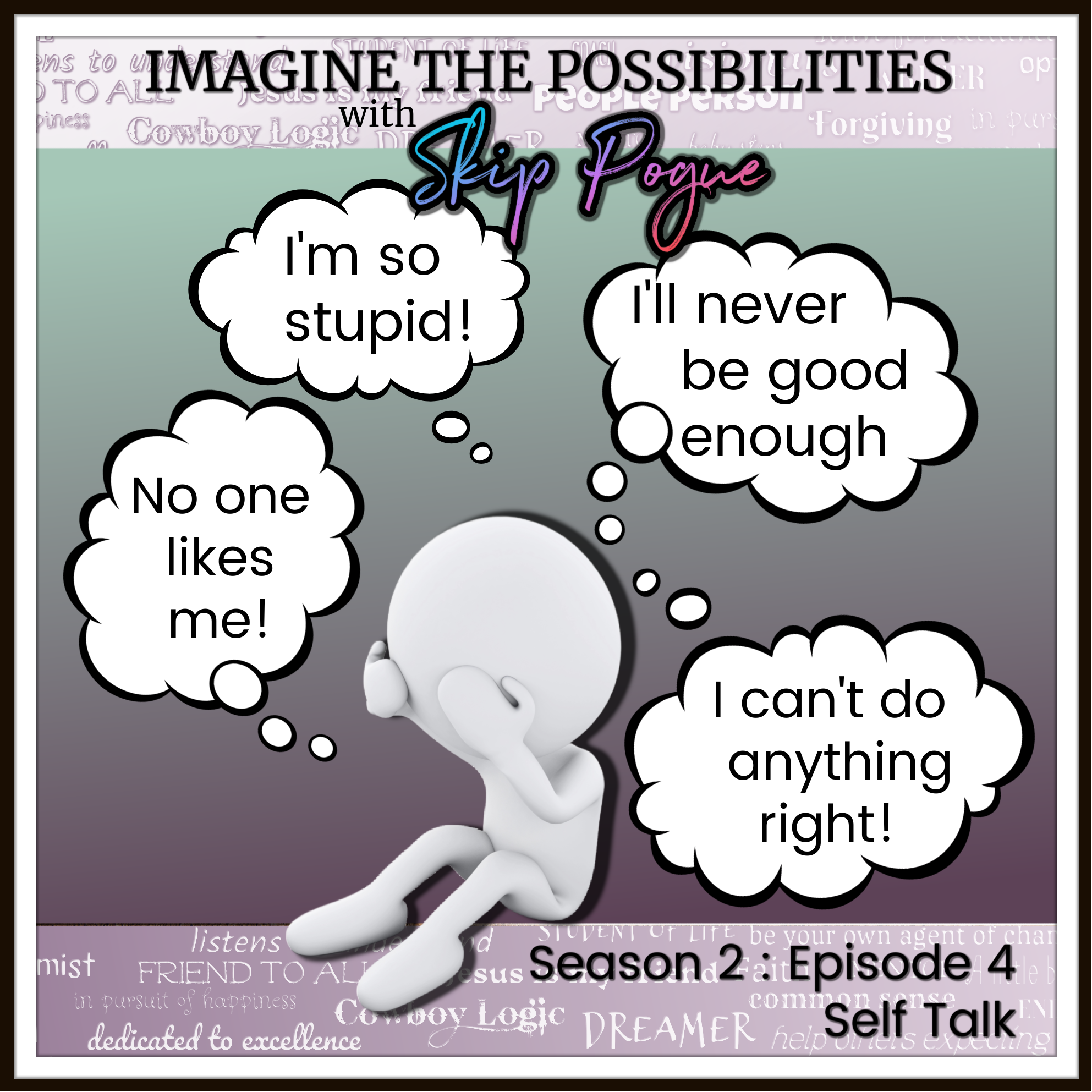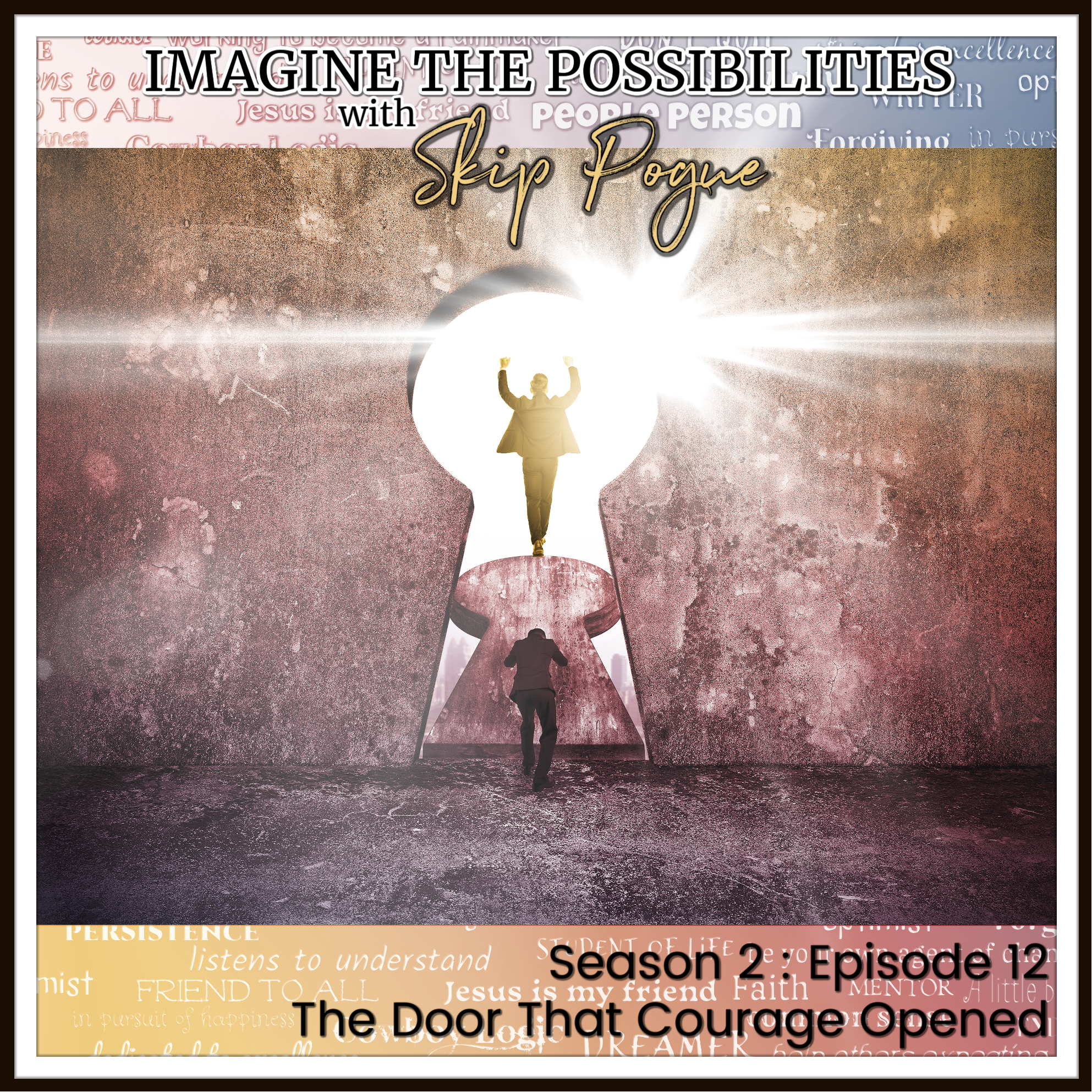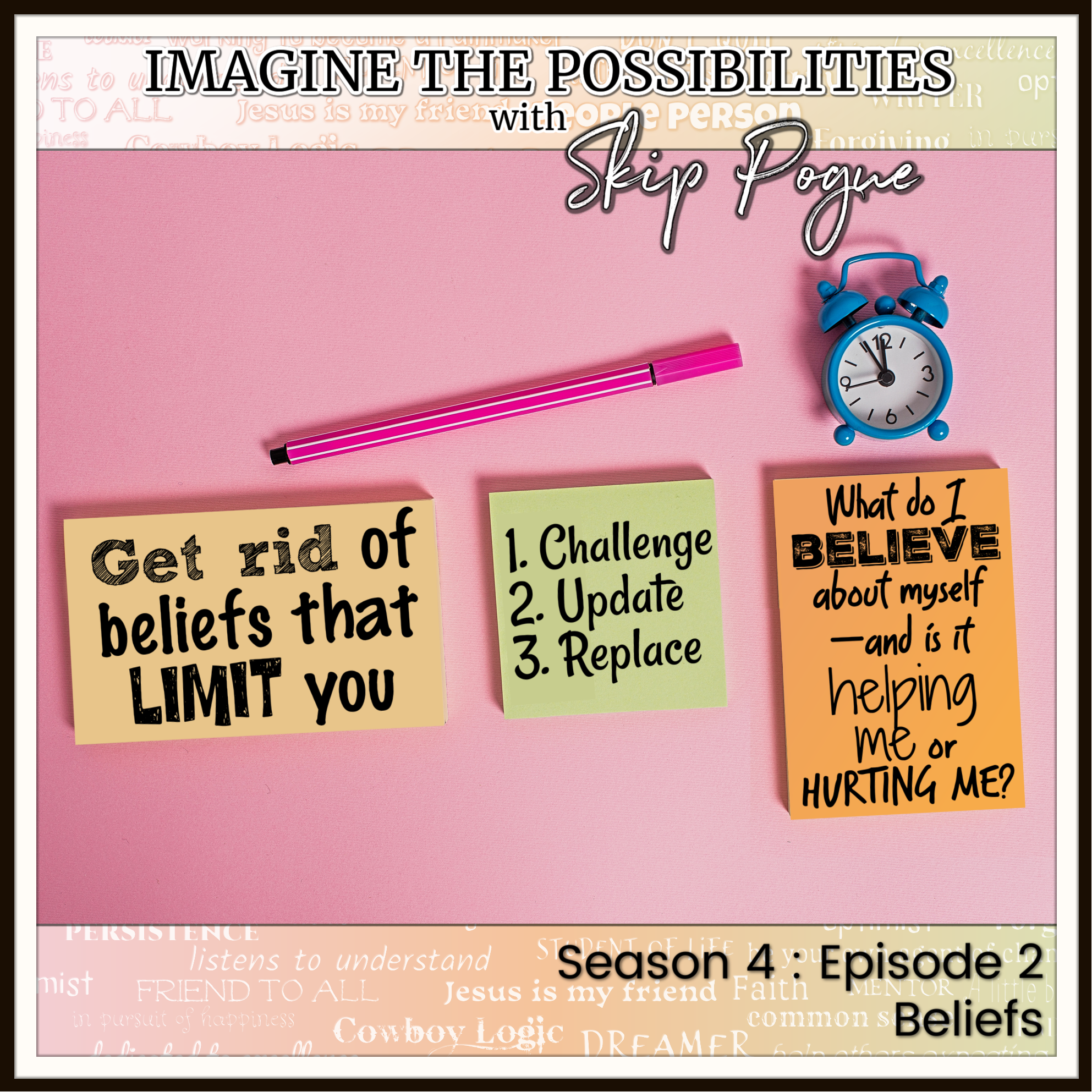Episode Transcript
[00:00:05] Hello and welcome to imagine the possibilities. My name is Skip Pogue.
[00:00:11] We're going to talk about something now that I find hard sometimes to understand. But there's such a thing as fault finders, people that continuously find fault with people.
[00:00:23] My philosophy is always look for the good in people.
[00:00:28] Back when I was working, I had the opportunity to hire a lot of people. Those I hired covered the gambit from positions from level one help desk analysts to team leads to site managers. It seemed that ever so often someone would question why I wanted to hire a particular individual, offering me observations like I don't think they're capable of doing the job. I don't believe they are a good fit for the job or my favorite why would you hire someone like them? Why would I hire someone like them? What does that even mean?
[00:01:00] In each case I realized that the individual making the statements was a fault finder. They always looked their person in the worst possible light and judged them based on their own views. Upon hearing these types of comments, I often responded, I know that they can do the job and give them the opportunity. I know they will do the job. I dont remember ever not hiring an individual based on comments like these. The fact is, not only did I hire them, but they turned out to be one of my best employees.
[00:01:30] I always looked for the best in people. Everyone with whom I came in contact, employed business associate, friend, family member, or complete stranger often wondered why people seemed to spend an inordinate amount of time looking for what was wrong with people. I'll give you a couple of examples. One, I'd become the director of help desk quality management. And in that position I had a team of managers working for me around the country, running various help desk sites for different customers we had.
[00:02:04] And I decided to do some training. And part of that training revolved around a new thing that I decided that would help morale and help employees and help managers all at the same time. When, when, and when. So I started doing some of the training with each individual manager. And I told him, I said, here's what I want you to do moving forward. I want you to take 30 minutes of a morning and 30 minutes of afternoon and walk around your departments. And what I want you to do is catch people doing something right.
[00:02:37] And when you catch them doing something right, I want you to stop. And at that moment, I want you to just walk up to them, tell them what you heard or saw, and tell them how much you appreciate that they're doing the job the way they are, that it helps everybody in the business helps the customer, it helps them, it helps you, and helps the overall business model, and do it in front of everybody. Don't make a big deal. Don't gather a crowd or anything. Just walk up and do that. When you're done, walk off.
[00:03:08] Now that employee is going to be smiling because he got a good compliment or she got a good compliment. So the people around her, the other team members, are going to go, what was that all about? What did Joe want with you? And they're going to tell them that he gave me this compliment. He heard me do something. He said it was really good, and yada, yada, yada, and everybody's gonna feel better.
[00:03:32] But I, after a little while, realized something. I had three managers out of a group that were fault finders. Although they would spend their 30 minutes of a morning and 30 minutes of an afternoon walking around, they hardly ever called anybody doing anything good. But if they heard or saw somebody do something wrong, they immediately went to that person and reprimanded them in front of everybody. They told them what they'd heard them do wrong, why they think it was wrong, how they needed to fix it right now, or else.
[00:04:10] And the morale in those three managers departments were going down the drain, and so were some of the employees. I had several employees come to me, and they said, you know, if this is the way it's going to be from now on, I'm going to look for another job. I didn't want them to do that, so I started working with the managers. I informed them what they were doing, informed them of what the program was all about, and said, you need to quit doing that. One thing you need to learn right now is that you praise in public and you reprimand or correct in private.
[00:04:43] So I thought they got it after that. Well, they didn't, and it happened again, especially with one particular manager. I told them the second time, and I put them on a program to fix the problem.
[00:04:55] And after a while, it got fixed. But in between that, it created a morale issue and everything else. Employees were upset. They were aggravated about what was going on, the way it was being handled, and everything else, but we did get it fixed, and the managers wound up being really good at finding people, doing things right and praising them in public.
[00:05:21] I told him, I said, this whole thing of counsel in private's very, very important. I said, moving forward, what I want you to do is if you do see somebody doing something wrong, don't stop what you're doing. Keep walking, take your phone out or your notebook or notepad, whatever. Make a little note who it is, what you heard, and everything in the time, and then go back to your office and wait about 15 or 20 minutes. Call the employee up, call them into your office, sit down, and use it as a teaching moment, and let them know what you saw and how they can improve it.
[00:06:02] Don't use it to beat them up. That's not going to fix anything. So we got a whole lot better, and that made a difference.
[00:06:13] The second issue was with employees being fault finders with other employees. I don't know if you've ever had this, a situation where one employee comes and basically says something about another employee not doing their job or yada, whatever, and they want it fixed. They didn't go to their manager. They came to me, and that was a little bit out of protocol, but I'm all right with it. I have an open door policy, so it's not a bad thing. And I didn't go report them to their manager immediately or any of that stuff. I listened to what they had to say, and then I talked to them about the fact that I understood why they were upset.
[00:06:55] But was this the best route to take for me to get involved in it? Or would it be better for maybe their team lead or their manager get involved in it? Or would it might even be more helpful if they simply had a chat with the employee themselves?
[00:07:11] And, you know, all of them seem to get along and everything, so maybe it's just, you know, hey, bub, you're doing this, and it's kind of impacting my job because I'm dependent upon you getting certain number of calls, and you're dependent on me doing this thing. So let's work together and get it done, and if you've got a problem, I can help you. And that one particular person did that, and I immediately, everything was copacetic. They were. They were happy. The other employee was happy, and all the complaints to me stopped. So I was glad of that. So you gotta watch that. Here's the thing, though. This same thing happens everywhere, not just in our job, but in our personal life. If you're of. If you have school age children, how many times have we as parents, had a child bring home maybe a bad grade or a report from a teacher that they acted out in class or something, and we responded negatively to that.
[00:08:17] During that same period of time between when that started and you got the note from the teacher, how many times did you praise your child? How many times did you look for the good things your child was doing? And reinforce the pure, the positive and the powerful. How many times? Because when I thought about it, I realized that I probably hadn't done that enough, that I was, by default, a fault finder.
[00:08:48] I waited somebody else to notify me of what the fault was, but I could have done that myself, and I also could have praised my child more, could have made sure that they were focused on what they were doing. And if they were having an issue, talk to me about it or talk to their mother about it. But instead, it was easier, I guess you'd say, to ignore it. So once I learned that, I decided that not only was I not going to ever be a fault finder again, but I was going to be a positivity seeker, that I was going to look for the positive in everything and everyone that I came in contact with. And ever since that day, I have. I look for the good in people because it's really important that we do that. It makes a difference. I don't care if it's a business, if it's a school, if it's you and your spouse or who it is. We need to find ways with our children today to reinforce the positive. And in doing so, we'll make things better for them and we'll make things better for us. And it's important that we focus on that.
[00:09:57] You think about in your church, every church I've ever attended, there was some person, or persons, usually more than one person, that somehow or another wanted to carry tales about somebody else. You probably know what I'm talking about.
[00:10:19] They were fault finders, and in doing that, they tended to polarize the church.
[00:10:30] There were people on the person's side, and other people chose the victim, if you want to side of the thing. So it was a matter of how do you balance that? How do you get it right? Well, let's quit looking for the negative. Let's quit being fault finders and look for positive stuff. Negativity does not buy us anything.
[00:10:54] If. If you think about it, if you are negative or I'm negative, or for heaven's sake, if both of us are negative, what do we do? We talk about our job. Let's say, okay, you and I work for the same company, doing the exact same job, maybe different departments. So we get together and we're fault finders.
[00:11:14] We start talking negatively about our job, the place, the company that we work for, the managers report, we report to and everything else. And in doing so, we just reinforce that negativity between each other. And that doesn't help us. It doesn't make it better, it makes it worse. So we need to look for the positive. And there's always positive things.
[00:11:40] I hear people all the time saying, oh, it's Monday morning, I got up. I got to get up and go to work.
[00:11:51] I just, I dread it.
[00:11:54] I got to the point in my career and I'm still that way. I get up really early and I get up with the idea, hey, I get to go to work today. And if you stop and have a little talk with yourself and think about how grateful you should be that you got up number one, that's a big bonus to start with. But you do. You get to go to work and you get to do something that you want to do. Maybe you don't want to work that day, but you do. You get to do something you want to do. You chose that career. If you've chose a career that doesn't suit you, then, and I'll talk about this in another podcast, but maybe you need to start looking at what you need to do to move to a different career.
[00:12:42] And it's not impossible. Same thing applies to your children. You know, when, when you get up, if you're still in the house and your spouse is in the house, when they're getting ready to go to school, don't send them off to school without breakfast. Don't send them off to school in a bad mood because you got up in a bad mood. You know, get up and be positive about stuff. It's a day. It's a new day. You have new opportunities.
[00:13:12] I keep telling everybody, and you are included in this. Everybody. Everybody can accomplish remarkable things.
[00:13:21] They just need to apply themselves and work toward whatever it is they want to accomplish, and they can accomplish it. So why wake up negatively? You know, I'm 77 years old, I got arthritis. I got all these things wrong. I'm a surviving cancer patient.
[00:13:42] But you know what?
[00:13:44] I'm alive. I'm living this life. And I decided, and I told you all in the first podcast I did, of all the things. Took me two years to get this podcast going because I ran into all this self doubt and stuff and this whole fault finder thing. I was really finding fault with myself when it wasn't there. So just think about it for a little bit and try to make the best of everything you do.
[00:14:14] It works and you'll be better for it, and everybody around you will be better for it. Too many times we look, an individual walks up to us, and if we're a fault finder, they may introduce themselves we may be at a meeting or a gun club or a racetrack or anything, and this individual walks up and introduces themselves and we immediately, if we're a fault finder, start looking. Well, they're not dressed very nice, they look a little scuffy, you know, shoes aren't shined, whatever. We look at it, you know, they're not smiling, and we immediately think, this is a bad guy, bad dude. I don't like him, you know, so we're judgmental. And I'm going to talk about being judgmental at another podcast, because that's another pet peeve of mine. But we form an opinion of that person and it may be 100% wrong because we didn't give them a chance. We looked for their faults, we looked at the fact they weren't dressed as nice as we were, they looked a little rough around the edges or whatever.
[00:15:33] We shouldn't do that. Look for the good in the person, find the good, because that's what we ultimately need to do for each other. So anyway, I'm going to leave it at that.
[00:15:47] And the message is, don't be a fault finder.
[00:15:52] Look for the pure, the positive and the powerful in every person and everything that you do. Because like I said, I have no doubt you can. You can do remarkable things, and you will, you've already probably done some and you will do those again. You will do other remarkable things. And in closing, I just want to leave you with idea that I know that you have the desire and the ability to do good.
[00:16:31] So use that and look for good in people and try to always approach them with an open mind and a positive attitude.
[00:16:42] So here's the deal. First thing I want to do is I truly, sincerely want to thank you for listening to this podcast. Hopefully you got a nugget or two out of it and something that will help you moving forward in being better at whatever you're doing.
[00:17:02] And that's all I'm trying to do, is tell you from my personal experience and the knowledge, what little bit of it I have, of how maybe you can help me, because I need help all the time. And maybe you can help yourself at the same time, which is great. So thanks again for listening. And if you have time, head over to imagine the possibilities life and check out the website that goes along with this. There'll be a transcript of this podcast there, along with some links and stuff, other things you might find interesting, a section I want to talk about me. If you want to see what my views are and what I believe and don't believe and what I like and what I dislike. And that dislike list is something that I'm adamant about making people understand that we don't need those things in our lives. We need to look for the positive stuff. We need to have a better attitude and all that stuff. And while you're there, if you've got a comment about this podcast, or any other podcast, or if you've got an idea or something you'd like me to address or talk about, just drop me a note there and I'll be glad to work on it. If there's a question you have about something I've said, or if you just want to discuss it a little bit more, just drop it in a note and I'll be glad to answer you. I will try to answer you as quick as I can. If it takes me a little while, just be patient. But I will respond to you with that. I'm just going to say, remember that your future belongs to you.
[00:18:47] Be kind, stay humble, love deeply, and laugh often.
[00:18:54] I hope that you have a super day, and I pray that God blesses each of you in a super way.
[00:19:01] Thanks again. God bless. Bye.
